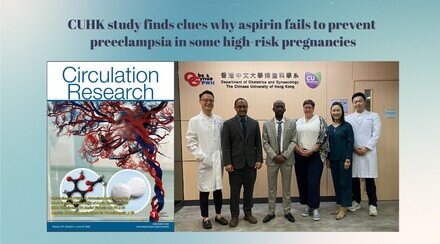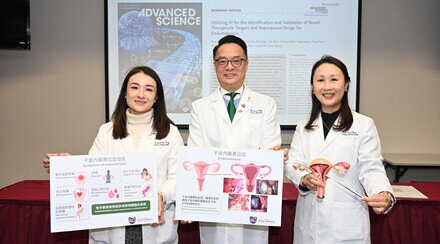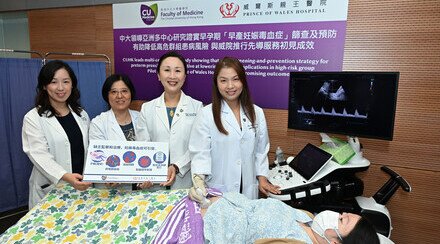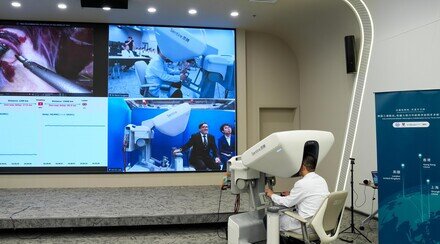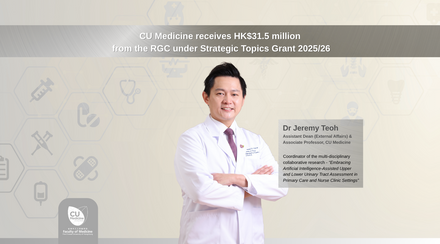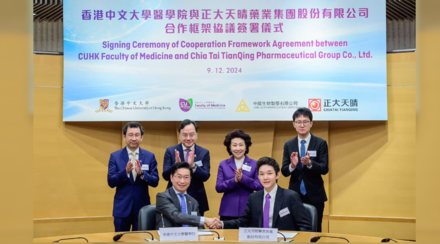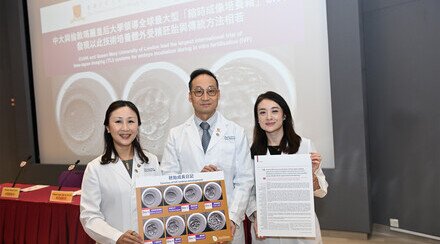CUHK-Baylor Study Proves Aspirin Reduces the Risk of Preeclampsia by Decelerating the Metabolic Clock of Gestation
A recently published joint study conducted by the Faculty of Medicine at The Chinese University of Hong Kong (CU Medicine) and Baylor College of Medicine (Baylor) in the U.S. has discovered that the benefit of aspirin treatment in preventing preeclampsia is mediated through decelerating the metabolic clock of gestation. The researchers analysed the blood samples collected from over 100 high-risk pregnant women at 11 to 13 weeks and 20 to 24 weeks of their pregnancy and demonstrated that the preeclamptic or non-preeclamptic outcome in response to aspirin treatment was significantly associated with the level of internal aspirin exposure ascertained from metabolomic data.
The researchers also constructed a model of the metabolic clock of gestation, and found that aspirin significantly decelerated metabolic gestational-age by 1.27 weeks in mid-gestation. One-fourth of the metabolites changed over gestational-age advancement were partially reversed, suggesting that aspirin treatment help prevent preeclampsia by slowing down the metabolic clock of gestation. The study results have just been published in the journal Hypertension.
Recent evidence shows aspirin treatment can reduce the rate of preterm preeclampsia by 60%
Preeclampsia is a multisystem disorder of pregnancy characterised by the onset of hypertension with significant proteinuria after 20 weeks’ gestation. This disorder affects 2% to 5% of pregnant women and is one of the leading causes of maternal and perinatal morbidity and mortality. Globally, it is associated with 76,000 maternal and 500,000 infant mortalities every year.
Low-dose aspirin has been proven to be beneficial in the prevention of preeclampsia when it is given daily before 16 weeks of gestation. Recent evidence from a multicentre, double-blind, randomised placebo-controlled trial (ASPRE: Combined Multi-marker Screening and Randomized Patient Treatment with Aspirin for Evidence-Based Preeclampsia Prevention), conducted by Professor Liona POON, Professor from the Department of Obstetrics and Gynaecology at CU Medicine, has demonstrated that aspirin prophylaxis could reduce the rates of preterm preeclampsia and all preeclampsia by 60% and 30%, respectively.
A tailored-made multivariate metabolic clock proves aspirin significantly decelerates metabolic gestational-age
The aim of the joint study is to understand why a significant proportion of aspirin-treated high-risk women still develops preeclampsia. The researchers performed untargeted metabolomic profiling on plasma samples of 58 participants in the aspirin group and 58 participants in the placebo group. They found out that aspirin induced a series of metabolomic alterations and the level of internal aspirin exposure is predictive of preeclampsia.
Through comparing the profile of women with and without preeclampsia after aspirin treatment, differences in 73 metabolites were detected. Some of which involve regulation that is of importance in pregnancy and placental functions, including glycerophospholipids metabolism, polyunsaturated fatty acid metabolism and steroid hormone biosynthesis.
To further understand the mechanism by which aspirin prevents preeclampsia, the researchers built a multivariate metabolic clock of gestation using the metabolomic profiling of the participants’ plasma samples. In the aspirin-treated group, gestational age acceleration significantly deviated from zero in a negative direction by 1.27 week on average, suggesting that aspirin significantly delayed metabolic gestational age. Changes during advancement of gestation were also partially reversed by aspirin in one-fourth of the pregnancy-related metabolites.
Professor Liona POON, the senior author of the study, stated, “Our work has made a major discovery on the mechanism of the prophylactic response of aspirin. Previously, we have hypothesised that aspirin prevents preeclampsia by delaying the gestational age at delivery. This work has lent further support to our hypothesis that the benefit of aspirin treatment in preventing preeclampsia is mediated through decelerating the metabolic clock of gestation. This finding has clinical implication as well. We can now explain to high-risk pregnant women that the benefit of aspirin is moderated via a delay in the onset of the disorder, thus reducing the risk of premature delivery associated with preeclampsia.”
Professor Ronald WANG, Division Head of Obstetrics and Gynaecology at CU Medicine, commented, “Preeclampsia is a serious obstetric complication, a consequence of maladaptation between placenta metabolism and maternal endothelial response, but the underlying mechanism remains to be poorly understood. This is an international, collaborative and multidisciplinary study combining maternal medicine, therapeutics, reproductive biology, metabolomics and bioinformatics. The study discovered novel and important metabolic pathways in placental ageing with great potential for disease understanding and therapeutic targets for preeclampsia.”
Dr. Sarah ELSEA, Professor of Molecular and Human Genetics at Baylor, said, “This international collaborative effort highlights the importance of both basic and translational studies in the assessment of therapeutic interventions. Defining the critical underlying metabolic pathways that are affected by aspirin treatment also provides mechanistic insight for the common pregnancy-related complication and opens up opportunities to further investigate these metabolic pathways as therapeutic targets.”
Dr. Aleksandar MILOSAVLJEVIC, Professor of Molecular and Human Genetics at Baylor, added, “A particularly innovative aspect of the metabolomic data analysis was the construction of the metabolic clock of pregnancy and the demonstration that aspirin exposure, as reported by patients and ascertained from metabolomic data, slows down the clock.”
Dr. Fernando SCAGLIA, Professor of Molecular and Human Genetics at Baylor and Clinical Director of the Joint Baylor-CUHK Center of Medical Genetics in Hong Kong, concluded, “This elegant study has been made possible by a fruitful research collaboration between our Department of Molecular and Human Genetics at Baylor, the Fetal Medicine Research Institute at King’s College in London, and the Department of Obstetrics and Gynaecology at CU Medicine under the auspices of the Joint Baylor-CUHK Center of Medical Genetics. These relevant findings showed that aspirin treatment resulted in a robust metabolomic signature lending support to the hypothesis that the use of aspirin may delay the onset of preeclampsia. The fruits of this research may potentially impact the clinical care provided to women in high-risk pregnancies.”

Investigators of the study are:
(First row, from left) Xiqi Li, Dr. Aleksandar Milosavljevic, Dr. Sarah Elsea and Professor Ronald Wang;
(Second row, from left) Dr. Fernando Scaglia, Professor Liona Poon, Professor Kypros Nicolaides and Dr. Argyro Syngelaki.


